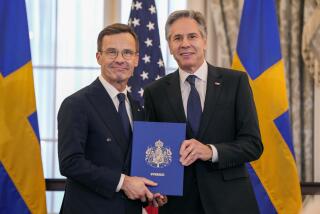Russia Rethinks Its NATO Strategy : Closer ties will put Moscow in good position to lobby against eastward alliance expansion
- Share via
Six months after it rejected an opportunity to move toward more cordial ties with NATO, Russia says it’s now ready to begin working with the alliance on an unprecedented program for closer cooperation.
In doing so, Foreign Minister Andrei Kozyrev made clear, Russia is not abandoning its opposition to NATO’s possible eastward expansion to take in several states that were once members of the Moscow-dominated Warsaw Pact. Russian suspicion about NATO’s growth--in fact, its anxieties about NATO’s very continuation as a military organization--remain strong. But for now President Boris Yeltsin’s government seems prepared to subordinate those concerns to its wish for closer relations.
For Moscow, it’s clearly the right tactical decision. Moscow has associated itself with the NATO-sponsored Partnership for Peace and won assurance of a unique special relationship with NATO that has not been not offered to any of the other 25 countries that have so far enlisted in the Partnership. By doing so, Russia gains a particularly strong platform from which to lobby against NATO’s expansion, for now one of its major policy goals in Europe.
The specifics of Russia’s closer cooperation with NATO will be determined in coming months. Broadly, they are expected to include joint military exercises and officer exchanges, consultations on how to draft the Russian defense budget and how to ensure democratic control over Russia’s military. These are all steps of benefit to the alliance.
But meanwhile, as Kozyrev emphasized, Russia will continue to press for a halt in NATO’s apparent drift toward expansion. Russia argues that what’s needed instead is the organization’s transformation from a military to a political body--in fact, NATO is already both--and a focus on the nebulous notion of “building jointly a single Europe.”
American and other NATO officials rightly insist that Russia will have no veto over what the alliance does. But at the same time the fact that Russia strongly opposes NATO’s expansion into Central and Eastern Europe does not automatically validate the wisdom of such an expansion. The leading candidates for future NATO membership--Poland, Hungary and the Czech Republic--are eager to join chiefly because, for understandable historical reasons, they fear a revival of Russian imperialism. Whether that fear is sufficient reason for NATO, and specifically the United States, to extend to these countries formal military protection with all that implies in terms of commitments, costs and responsibilities remains very much an arguable point. The forum for that debate is within NATO, where the United States must speak with a clear sense of where its long-term interests lie.
More to Read
Sign up for Essential California
The most important California stories and recommendations in your inbox every morning.
You may occasionally receive promotional content from the Los Angeles Times.













